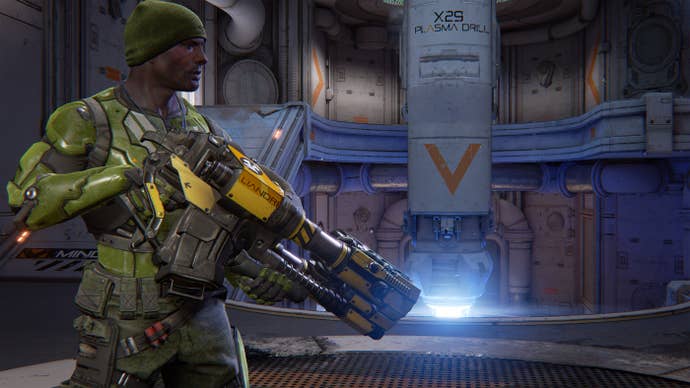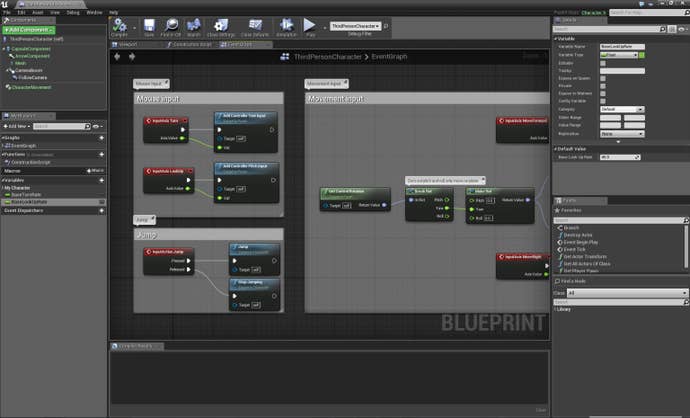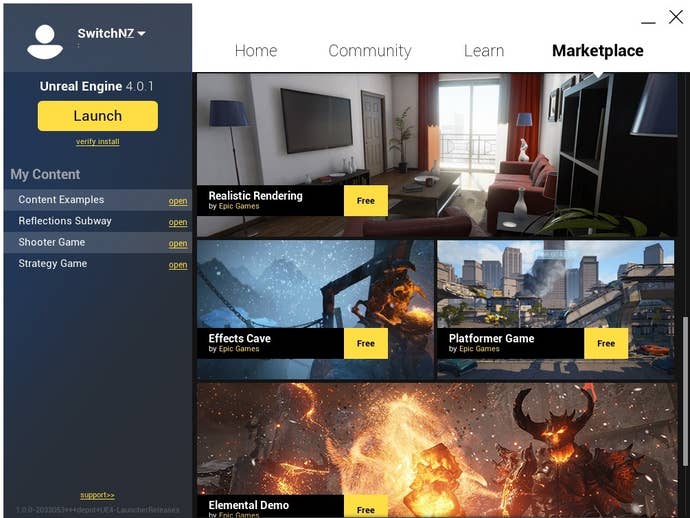Unreal Engine 4 Goes Free, Epic Aims For Everyone
If you want to make video games, Epic Games adds another enticing option.
This article first appeared on USgamer, a partner publication of VG247. Some content, such as this article, has been migrated to VG247 for posterity after USgamer's closure - but it has not been edited or further vetted by the VG247 team.
Unreal Engine 4 is now free. Epic Games announced today that its development engine would be going completely free and all future updates would be free as well. No subscription fee, no catches. All Epic wants from you is an account registration and a 5 percent royalty on gross revenue after the first $3,000 per product, per quarter.
If you've already spent the money on a subscription, Epic Games will be offering a prorated refund for this current month. Subscribers will also received a $30 credit to buy assets and more on the Unreal Engine Marketplace.

"This is the complete technology we use at Epic when building our own games," said Epic co-founder Tim Sweeney. "It scales from indie projects to high-end blockbusters; it supports all the major platforms; and it includes 100% of the C++ source code. Our goal is to give you absolutely everything, so that you can do anything and be in control of your schedule and your destiny. Whatever you require to build and ship your game, you can find it in UE4, source it in the Marketplace, or build it yourself – and then share it with others."
"Beyond the tools and source, Unreal Engine 4 provides an entire ecosystem. Chat in the forums, add to the wiki, participate in the AnswerHub Q&A, and join collaborative development projects via GitHub. Buy content in the Marketplace, or build your own and sell it there."
This announcement is only four days off from the reveal of Unreal Engine 4.7, which added a number of new features. These features include improved foliage rendering and lighting, in-world component editing, improved Blueprint scripting, HTML5 and WebGL support on Windows, and the full engine C++ source code. It's only two weeks out from the announcement of Unreal Dev Grants, which sets aside a $5 million fund to help new projects being built in Unreal Engine 4.
Last year saw a complete overhaul of Epic Games' presentation of Unreal Engine. What was once a high-end engine for major companies became a high-end engine for everyone that could afford the monthly fee. If you were in the educational sector, it became free. Epic Games tore down its existing website and launched with a stronger community site, full of helpful tutorials in video and text format. Epic essentially said "Please come use Unreal Engine."

"We're in this with the developers - this is a long term business prospect," Sweeney told GamesIndustry.biz. "We're asking for 5 per cent royalties on the game, so our sole perspective is to make this technology as widely available as possible, to help developers succeed so we can succeed along with them."
"We've also seen huge amounts of use of the engine in areas we didn't really expect, like architectural visualisation, training simulation. What's even cooler is that there's been a lot of cross-pollination within the game development community. Once you've created Unreal assets, those can be used anywhere, so the textures that people create for an architectural visualisation are the same materials that can be used for realistic game environments."
The reasons for these changes come down to the relative strength of Unity Technologies and its engine. Unity has been the go-to engine on the indie side of the market due to its relatively low barrier of entry, ability to handle a number of different game types, and support of most gaming platforms. UnityPro is a pricey option at $1,500 or $75 per month, with additional platform specific add-ons at the same price, but Unity's free version is very robust.
Unity has powered a number of released and upcoming indie games Republique Remastered, Starr Mazer, Enter the Gungeon, The Deer God, Infinifactory, Radial-G, and The Escapists. In contrast to Unity, Unreal Engine is still on the high-end. Recent and upcoming Unreal Engine games include EVE: Valkyrie, DmC, Dreadnought, Mortal Kombat X, Daylight, Rime, Brothers: A Tale of Two Sons, and Fable Legends.
What you probably notice about these lists are the difference in who in making the games. Unity owns the indie market, while Unreal Engine (and CryEngine) is the preference of established studios. The problem is many major publishers are turning towards in-house solutions: EA's games are all built in Frostbite 3, Ubisoft is working with AnvilNext and Disrupt, Activision Blizzard has a number of in-house engines. Epic wants that low-end market to make up for the big-budget market they've lost.

With the royalty model, they're hoping for interesting creative titles will that take off and make tons of money. That said, a free Unreal Engine is enticing. I'm not a developer, but for free, I'm willing to boot up Unreal Engine 4 once or twice and see what I can make. At the very least, Epic Games is still making Unreal Tournament and I could attempt to create a new level. Indie developers who are prototyping their games right now have the ability to choose between Unity and Unreal Engine. It remains to be seen whether Epic Games can capture the hearts of indie developers, but I'm thinking this is definitely the right move.

